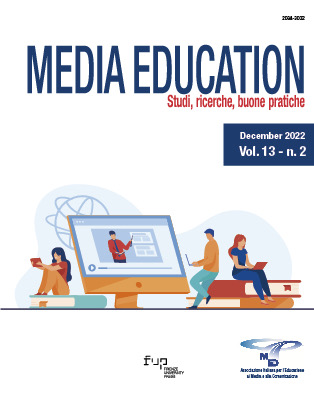Published 2022-11-08
Keywords
- media education,
- media literacy,
- educommunication,
- Core Concepts,
- Peru
Abstract
This paper compares the results of a media literacy test taken in 2009 and 2019 at three schools in Lima, Peru. To understand the study’s results in this 10-year comparison, the context surrounding the study is examined, including Peru’s approach to national standards and curriculum and the Center for Media Literacy’s frameworks for media literacy. Although technology, especially social media, advanced dramatically during this 10-year period, students continued to demonstrate that they doubt the media. However, the paradigm that has prevailed in Peru has been to provide technology to schools instead of promoting media literacy in the curriculum or in teacher training, ignoring Latin American tradition of educommunication. After initial promising results for students’ understanding Core Concepts of media literacy, later results in 2019 show that these Concepts were not retained, nor was teacher training reinforced. The combination of more teacher training and incorporating media literacy into the national curriculum can be powerful drivers for introducing media literacy into the education system of Peru. This article, based on survey results from three Lima-based private schools, contends its importance and urgence, over all in the context of global Covid-19, which has forced school lockdowns for almost two years, increasing Peruvian children’s exposure and interaction with media.
References
Buckingham, D. (2018). Media literacy policy in Europe: where are we going? Retrieved from https://davidbuckingham.net/2018/05/18/media-literacy-policy-in-europe-where-are-we-going/
Bulger, M. & Davison, P. (2018). The Promises, Challenges and Futures of Media Literacy. Journal of Media Literacy Education, 1(10), 1-21. https://doi.org/10.23860/JMLE-2018-10-1-1
Cabero, J. & Llorente Cejudo, M. C. (2008). La alfabetización digital de los alumnos. Competencias digitales para el siglo XXI. Revista portuguesa de pedagogía, (42-2), 7-28. https://doi.org/10.14195/1647-8614_42-2_1
Díaz, H. (2015). Formación docente en el Perú. Realidades y tendencias. Santillana.
Fingar, K. & Jolls, T. (2013). Evaluation of a School-Based Violence Prevention Curriculum. Injury Prevention, 20(3). http://dx.doi.org/10.1136/injuryprev-2013-040815
Fingar, K. & Jolls, T. (2020). Evidence-Based Frameworks: Key to Learning and Scaling Globally. In Pérez Tornero, J. M., Orozco, G. & Hamburger, E. (Eds.), Media and information literacy in critical times: Re-imagining learning and information environments. UNESCO MILID Yearbook 2018-2019. Retrieved from https://www.medialit.org/sites/default/files/MILIDYearbook2018-19%20copy%202.pdf
Ferrés, J. & Piscitelli, A. (2012). Media competence. Articulated proposal of dimensions and indicators. Comunicar, 38, 75-82. https://doi.org/10.3916/C38-2012-02-08
Freire, P. (1970). Pedagogy of the Oppressed. Seabury Press.
Gutierrez-Castillo, J., Cabero, J. & Estrada, L. (2017). Diseño y validación de un instrumento de evaluación de la competencia digital del estudiante universitario. Revista Espacios, 38(10). https://idus.us.es/handle/11441/54725
Hootsuite (Jan. 2020). The World’s Most-Used Social Platforms. Retrieved from https://www.hootsuite.com/newsroom/press-releases/digital-2020-social-media-use-spans-almost-half-global-population
Jenkins, H., Clinton, K., Purushotma, R., Robison, A. & Weigel, M. (2004). Confronting the Challenges of Participatory Culture. The MacArthur Foundation. Retrieved from https://www.macfound.org/media/article_pdfs/jenkins_white_paper.pdf
Jolls, T. & Wilson, C. (2014). The Core Concepts: Fundamental to Media Literacy Yesterday, Today and Tomorrow. Journal of Media Literacy Education, 6(2), 68-78. Retrieved from https://digitalcommons.uri.edu/jmle/vol6/iss2/6
Lombana, D. (2021). “Educomunicación”: The Media Education (and literacy) Approach from Latin America. Retrieved from https://andreslombana.net/blog/2021/02/11/educomunicacion-the-media-education-and-literacy-approach-from-latin-america/
Martín-Barbero, J. (1998). Inheriting the future. Thinking education from communication. Culture and Education, 10(1), 17-34. https://doi.org/10.1174/113564098760604947
Mateus, J-C. & Suárez-Guerrero, C. (2017). La competencia TIC en el nuevo currículo peruano desde la perspectiva de la educación mediática. EDMETIC, 6(2), 129-147. https://doi.org/10.21071/edmetic.v6i2.6908
Mateus, J-C. & Quiroz, M-T. (2017). Educommunication: A Theoretical Approach of Studying Media in School Environments. Revista Latinoamericana de Ciencias de la Comunicación, 14(26), 152-163. http://revista.pubalaic.org/index.php/alaic/article/view/915
Mateus, J-C. & Hernández-Breña, W. (2019). Design, Validation, and Application of a Questionnaire on Media Education for Teachers in Training. Journal of New Approaches in Educational Research, 8(1), 34-41. http://dx.doi.org/10.7821/naer.2019.1.329
Mateus, J-C., Andrada, P. & Quiroz, M-T. (2019). Media Education in Latin America. Routledge. https://doi.org/10.4324/9780429244469
Mateus, J.-C., & Quiroz, M. T. (2021). La “Competencia TIC” desde la mirada de docentes de secundaria: más que habilidades digitales. Revista Peruana De Investigación Educativa, 13(14), 7-23. https://revistas.siep.org.pe/index.php/RPIE/article/view/266
Ministry of Education, Peru (2017). Currículo Nacional de la Educación Básica. Minedu. Retrieved from http://www.minedu.gob.pe/curriculo/
National Council of Education (2016). Encuesta Nacional a Docentes de Instituciones Educativas Estatales y No Estatales - ENDO 2014. CNE.
Pew Research Center (2020). Internet/Broadband Fact Sheet. Retrieved from https://www.pewresearch.org/internet/fact-sheet/internet-broadband/
UNESCO (2011). Media and information literacy curriculum for teachers. Retrieved from https://unesdoc.unesco.org/ark:/48223/pf0000192971_eng
UNESCO (Ed.) (2021). Media and Information Literate Citizens: Think Critically, Click Wisely! Retrieved from https://bit.ly/2SSynOr


